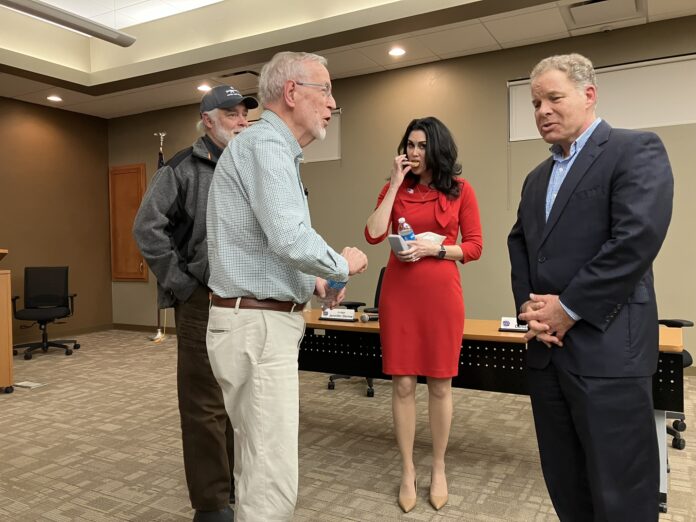DE PERE – At the Lawrence Town Hall in De Pere on February 14 – just one week before the Wisconsin Spring Primary Election – two candidates for the Wisconsin State Supreme Court vied for the votes of 65 audience members. Judge Jennifer Dorow and Justice Dan Kelly fielded more than a dozen questions at the event, which was hosted by Northeast Wisconsin (NEW) Patriots.
In introductory remarks, Dorow, who has served more than 11 years as Waukesha County Circuit Court Judge and presided over the trial of Waukesha Christmas Parade murderer Darrell Brooks, touted her 26-year legal career and more than 100 law enforcement endorsements. Kelly emphasized his record as a proven judicial constitutionalist committed to the rule of law, as documented by opinions he wrote while serving on the Wisconsin Supreme Court from 2016 to 2020.
The first two questions from the audience addressed election integrity. Both Dorow and Kelly emphasized the need for the legislature and Wisconsin Elections Commission to follow the laws already on the books; the State Supreme Court would get involved only upon complaints that the legislative or executive branches didn’t follow the law. Both pledged to apply the law as written rather than legislate from the bench, noting the front-running liberal candidate for the court, Janet Protasiewicz, has been forecasting how she’d decide cases even before hearing arguments. A follow-up question asked whether judicial ethics would require Protasiewicz to recuse herself from cases on which she had expressed an opinion in advance. Kelly noted recusal cannot be forced – it’s up to the individual justice to recuse him/herself from a case. “Character counts,” he emphasized.
A later question also addressed election integrity, specifically asking Kelly about a meeting at which he essentially said “there’s nothing to see here” with respect to fraud in the 2020 presidential election. Kelly defended his position, noting the role of the court is to rule based on the law and evidence presented to it. The court’s mandate is not to look for evidence of fraud. He pointed out that Wisconsin has anonymous balloting, so there is no way to discern whether a ballot, once filed, was legitimate or fraudulent.
Another question to the candidates focused on case backlogs and whether the State Supreme Court can “do anything” to fix the problem. Dorow touted her record, saying her district had limited case backlogs during Covid, and after the Covid lockdown was lifted she came up with a plan to address the small backlog. She and Kelly both expressed support for e-filing of court cases, which eases the paperwork burden and makes it easier for attorneys and their clients to track the status of cases. Kelly noted he and State Supreme Court Justice Rebecca Bradley looked for ways to move cases through the system expeditiously.
A related question had to do with the state’s shortage of district attorneys. Kelly explained it’s a matter of pay: While private firms are paying new law school graduates upwards of $150,000, a district attorney’s starting pay is less than $57,000. Pay scales are set by the state legislature. Dorow added the State Supreme Court justices have influence, noting the issue could be addressed by the Criminal Justice Collaborating Council established by Gov. Tony Evers.
Dorow was asked why she chose to run – what was it about Dan Kelly that made her think she needed to be in the race? She responded, “It’s not about Dan Kelly, it’s about giving Wisconsin voters a chance to choose someone who can beat Janet [Protasiewicz].” She reiterated her experience and law enforcement endorsements, “four times as many law enforcement endorsements as the other three candidates combined.” Kelly countered by saying he is electable. He lost a re-election bid in 2020, he said, only because there was also a presidential primary at the time, which attracted unprecedented attention from Democrats. “I learned my lesson,” he said, “I cannot beat Joe Biden and Bernie Sanders.”
The candidates were asked why law enforcement endorsements are important. Both noted such endorsements suggest a candidate’s support for law and order. Dorow noted the endorsements are evidence of a “vetting process.”
Dorow was asked whether she is soft on crime, with the questioner citing two cases she decided in Waukesha County: an unlawfully light sentence she gave to a multiple DUI offender and her sentence of a domestic violence offender, to whom she gave two days’ “free time” to get his affairs in order, during which time he stabbed his in-laws in Illinois. Dorow would not comment on the DUI case, noting the matter has been remanded back to her for re-sentencing. She said the second case was one of four the left was using to attack her – out of 16,000+ cases she has heard during her tenure.
The candidates were asked to define “inalienable rights.” Dorow noted the constitution is not a “living, breathing document that can change over time” – it identifies inalienable rights and those are the only ones. Kelly noted the founders were heavily influenced by philosopher John Locke (1632-1704), who emphasized that government authority comes from the consent of the governed.
The candidates were asked how much they’ve raised for their campaigns and whether that affects their electability. Kelly did not respond directly but noted spending by a campaign itself is only a very small percentage of the spending that takes place; independent expenditures are vastly more, so candidates don’t have much control over how much money is spent on their campaigns. Dorow noted she raised $700,000 in the first 70 days of her campaign, 96 percent of it from Wisconsin.
Two additional questions aimed at getting to the heart of the candidates’ judicial philosophy. They first were asked, why did you get into the law? Dorow said she started with a broadcast journalism degree but felt “a calling” to defend religious First Amendment rights. Her law degree is from Regent University School of Law. Kelly said he fell in love with the law in the seventh grade, noting his parents modeled for him a commitment to justice. He, too, received his law degree from Regent University School of Law.
The candidates were asked to name their favorite State Supreme Court and U.S. Supreme Court justices. Kelly identified Wisconsin State Supreme Court Justice Rebecca Bradley, with whom he has worked and shares similar judicial philosophies. He was torn between Justice Antonin Scalia (1936-2016) and Justice Clarence Thomas as his favorite U.S. Supreme Court justices: Scalia for his “beautifully written” decisions that “cut through to the heart of the matter,” and Thomas for “going back to the historical foundations of our country, to the bones of the Constitution, for his commitment to the Constitution.” Dorow said she admires retiring Wisconsin State Supreme Court Justice Patience Roggensack and Chief Justice Annette Ziegler, whose “career path has been similar to mine.” On the U.S. Supreme Court, she admires Justice John Marshall Harlan for his dissent in Plessy v. Ferguson and Justice Amy Coney Barrett for her faith and similar career path.
In closing remarks, Kelly urged the audience to look “really closely” at the records of all four candidates. He notes it is “your responsibility” as voters to look at the candidates’ past, the best indicator of how they’ll decide cases in the future.
Dorow emphasized the importance of the race and noted “our #1 goal must be to make sure we don’t have an activist justice.” She said, “you need someone who can beat the liberal. Look at who’s vetted me, who’s supporting me.”
———-
The Wisconsin Spring Primary Election is Tuesday, February 21. Early voting has already begun. To find your polling place or learn more about early voting, go to MyVote Wisconsin.
Remember, you will choose only ONE candidate for the Wisconsin State Supreme Court. The top two vote-getters will be on the April 4 General Election ballot.
There are many other important races on the ballot, depending on where you live, among them the race for Green Bay Mayor, Outagamie County Executive, Wisconsin Senate District 8, and several school board races. Visit the Endorsements page of the Wisconsin Patriots Toolbox to see which candidates have been recommended by conservative individuals and organizations across the state.


